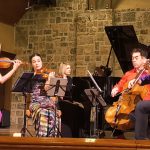October 29, 2021
Alice Tully Hall, Lincoln Center, New York City, NY
Jeffrey Milarsky, music director; Catherine Boyack, flute; Ryan Jung, piano; Oliver Xu, xylophone; Simon Herron, marimba.
BOULEZ: Mémoriale
SINGLETON: Again
MESSIAEN: Sept Haïkaï
George Grella | 2 NOV 2021
Among the welcome return of classical music institutions and concert series all across New York City, the Juilliard School—which annually boasts a generous number of high-level performances—is also back to a full performance schedule. The last Friday night in October, that meant one of Juilliard’s two new music ensembles, AXIOM, playing music by Pierre Boulez, Alvin Singleton, and Olivier Messiaen under conductor Jeffrey Milarsky and in front of an enthusiastic audience in Alice Tully Hall.
AXIOM may be a student ensemble, made up of both undergrads and graduate students, but it is one of the leading new music groups in New York. A good deal of credit goes to Milarsky, who is one of the most cogent conductors on the scene, and gives the musicians plenty of opportunities to shine. The ensemble’s guiding statement, that it is “dedicated to performing the masterworks of the 20th- and 21st- century repertoire,” is anodyne on its face. The execution of this idea in Alice Tully came through in an oddly disjointed manner—on the one hand, there was a terrific performance of an under-heard work by a composer who deserves a great deal more recognition than he has had, and on the other, the most well-known work on the program came off poorly.
The concert began with Boulez’ brief, colorful Mémoriale, for a small ensemble with a flute soloist—graduate student Catherine Boyack. It’s a stand-alone work adapted from his large-scale …explosante-fixe… one of the composer’s finest works. With that composition, Mémoriale, which honored the death of flutist Lawrence Beauregard, shares a method that begins with an atonal phrase but freely moves through tonal harmony, pulsing with bright details of orchestration and the ebb and flow of tempo that resembles the currents and eddies of a stream.
Boyack played with a big, rich sound, even through fluttered-tongued passages, and had an expression tinged with a touch of eagerness to push the music forward and see where it went. AXIOM responded skillfully to Boulez’ orchestration, the musicians and conductor balancing fine degrees of dynamics between instruments, combining timbres to create varied, subtle shifts in hues, like holding a prism up to the sun. This was an assured performance.
Singleton is a Black American composer who found the artistic validation and freedom needed to cultivate the depth of his voice during a long residency in Europe. He has one of the unique styles in contemporary music, making through-composed pieces that, even as they are abstract, have the sense of communicating their meaning with sincerity and clarity. The lines and events in his work are always interesting, and even short pieces travel far before they end.

American composer Alvin Singleton (credit: Martin Popeláø)
Again begins with a nervous fanfare, then follows a dramatic, sinuous journey. There are moments of crisis then relaxation, and the pulse develops both speed and mass as the music moves along. It’s an exciting work that builds anticipation and then comes to a fully satisfying conclusion, and AXIOM gave it a performance to match. There is a balance of repetition and forward movement to Again, and Singleton’s work in general, that is familiar to ears steeped in jazz and popular music but not often heard in classical thinking. But for these young musicians, the style and details were natural, they are a generation that has fewer artificial limits on how they listen. They were fully at home in Singleton’s rhythms and his quirky sense of gesture, and the performance had the aura of something non-classical and non-jazz, an actual new idea.
In this context, it was at first surprising and then almost understandable that Messiaen’s Sept Haïkaï came off as awkward and somewhat confused. Now 60 years old, after Boulez (a Messiaen acolyte) and Singleton the piece did sound old-fashioned, looking back at a time when life was, for better or worse, perhaps more structured and predictable.
Messiaen’s colors and his use of non-Western rhythms are still fresh, but the playing didn’t bring this across. The poetic inspiration of the music meant for the composer something static, in the sense of a tableaux, but still full of energy. The latter comes from the concerto-like solo parts for piano, played by Ryan Jung, and two percussionists playing xylophone and marimba, Oliver Xu and Simon Herron.
The soloists were sharp as tacks, Jung in particular playing with agility and strength. The trio felt the dynamic spring in the rhythms, that they are meant to move without having to go forward, but the ensemble itself sounded sluggish and often confused, like they were uncomfortable with the composer’s idiom. There was plenty of energy but little coherence, except for the lead voices. The fourth part, “Gagaku,” sounded the most natural, but the extreme verticality of the performance overall left one feeling uneasy. ■
RECENT POSTS







.png)